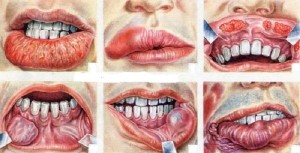Overview
Oral cancer includes cancers of the mouth and the back of the throat. Oral cancer most often occurs in people over the age of 40 and affects more than twice as many men as women. Most oral cancers are related to tobacco use, alcohol use (or both), or infection by the human papilloma virus (HPV).
Causes
Tobacco and alcohol use. Tobacco use of any kind, including cigarette smoking, puts you at risk for developing oral cancers. Heavy alcohol use also increases the risk. Using both tobacco and alcohol increases the risk even further.
HPV. Infection with the sexually transmitted human papillomavirus has been linked to oral cancers.
Age. Oral cancers most often occur in people over the age of 40.
Sun Exposure. Cancer of the lip can be caused by sun exposure.
Diet. A diet low in fruits and vegetables may play a role in oral cancer development.
Symptoms
If you have any of these symptoms for more than two weeks, see a dentist or a doctor.
- A sore, irritation, lump or thick patch in your mouth, lip, or throat
- A white or red patch in your mouth
- A feeling that something is caught in your throat
- Difficulty chewing or swallowing
- Difficulty moving your jaw or tongue
- Swelling in your jaw
- Numbness in your tongue or other areas of your mouth
- Pain in one ear without hearing loss
Diagnosis
Because oral cancer can spread quickly, early detection is important. The exam is painless and takes only a few minutes. During the exam, your dentist or dental hygienist will check your face, neck, lips, and entire mouth for possible signs of cancer.
Treatment
When oral cancer is detected early, it is treated with surgery or radiation therapy. Oral cancer that is further along when it is diagnosed may use a combination of treatments.Your doctor may refer you to a specialist.Other health care professionals who may be part of a treatment team include dentists, plastic surgeons, reconstructive surgeons, speech pathologists, oncology nurses, registered dietitians, and mental health counselors.





